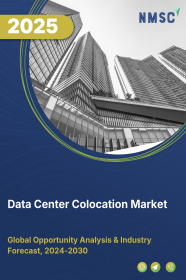
APAC Data Center Market by Component (Hardware, Software, Service), by Type (Colocation, Hyperscale, Edge, Other Types), by Deployment Model (On-Premises, Cloud, Hybrid), by Tier Standard (Tier 1, Tier 2, Tier 3, Tier 4), by Energy Requirement & Power Density (Low Power, Medium Power, High Power), by Cooling Techniques (Air Cooling, Liquid Cooling, Others), by Enterprise Size (Large Enterprises, Others), by End User (BFSI, Other End Users)– Opportunity Analysis and Industry Forecast, 2024–2030
Industry: ICT & Media | Publish Date: 09-Apr-2025 | No of Pages: 294 | No. of Tables: 215 | No. of Figures: 160 | Format: PDF | Report Code : IC2435
US Tariff Impact on Asia-Pacific Data Center Market
Trump Tariffs Are Reshaping Global Business
Asia-Pacific Data Center Market Overview
The Asia-Pacific Data Center Market size was valued at USD 31.89 billion in 2023, and is predicted to reach USD 77.29 billion by 2030, at a CAGR of 13.5% from 2024 to 2030.
The data center also known as network infrastructure market encompasses the planning, construction, operation, and upkeep of infrastructure dedicated to housing computing systems. It encompasses various components such as servers, storage systems, and networking gear, and provides services such as cloud computing and connectivity solutions. Currently, the industry is experiencing widespread adoption of cloud services, alongside the rise of edge computing to minimize latency.
Key trends include an emphasis on sustainability, increased cybersecurity concerns, the integration of hybrid and multi-cloud approaches, and the influence of 5G networks. These trends underscore the industry's response to the growing demand for scalable, efficient, and secure data processing and storage solutions in the era of digital transformation. According to the United States International Trade Commission, the data processing and storage market is projected to expand from USD 56 billion in 2020 to USD 90 billion by 2025.
Rapid Digital Transformation Fuels the Market Growth
The Asia-Pacific region is witnessing rapid digital transformation across various sectors, driving the demand for data center services. As businesses and governments embrace digital technologies to enhance efficiency, improve services, and remain competitive, the need for robust data infrastructure increases.
This trend is particularly prominent in countries including China, Japan, India, and South Korea, where ambitious digital initiatives and innovative projects are driving substantial investments in network infrastructure. The growing adoption of cloud computing, IoT, AI, and big data analytics further amplifies the demand for data processing and storage capabilities, propelling the expansion of the market in the region.
Strategic Investments and Collaborations Propels the Growth of the Market
Strategic investments from major technology companies, government initiatives, and collaborations between public and private entities are driving the expansion of the network infrastructure market in the Asia-Pacific region. Countries such as India, Indonesia, Singapore, and Malaysia are actively promoting the development of the market infrastructure through incentives, partnerships, and regulatory reforms.
Additionally, international players such as Microsoft, Google, Amazon, and NTT are making significant investments in the region to capitalize on the growing demand for cloud services and data storage. These investments, coupled with initiatives aimed at enhancing sustainability and energy efficiency, are contributing to the rapid growth and evolution of the market across Asia-Pacific.
High Initial Investment Challenges the Market Growth
The data center industry grapples with notable hurdles, prominently the high initial investment required and stringent environmental regulations. Establishing and maintaining network infrastructure demands significant upfront financial commitments, creating barriers for smaller businesses and start-ups. Additionally, compliance with environmental regulations necessitates ongoing investments in energy-efficient technologies hinders the overall market growth.
Integration of Edge Computing Presents Lucrative Opportunity for Market Expansion
The integration of edge computing into network infrastructure operations holds significant promise for the industry's future. By minimizing latency and enabling real-time processing, edge computing supports applications such as IoT and AR, easing the burden on centralized cloud data centers and offering scalability and flexibility.
This decentralized approach not only enhances security by processing sensitive data locally but also aligns with evolving digital landscapes, creating diverse opportunities for network infrastructure providers. Recent investments in startups such as Armada highlight the growing interest in edge computing solutions, reflecting a concerted effort to address connectivity challenges and bridge the digital divide.
China Holds the Dominant Market Share in Asia-Pacific Data Center Market
China holds the dominant position in the global network infrastructure landscape, boasting a staggering 440 operational facilities spread throughout the nation, according to CloudScene's data. This expansion parallels the remarkable growth of China's digital economy, that surged to 41.5% of the GDP, amounting to around 7.25 trillion US dollars in 2022.
This surge underscores China's commitment to modernization, a commitment vividly demonstrated at the 6th Digital China Summit. As the digital realm continues to flourish, it is poised to exert a profound influence on China's data center industry, showcasing the nation's steadfast dedication to digital advancement.
Furthermore, China's data center sector is witnessing a wave of innovation, fueling market demand. Notably, China achieved a significant milestone with the establishment of the world's inaugural submerged commercial network infrastructure off the coast of Hainan Island. Spearheaded by collaboration between Highlander, a private network infrastructure entity, and China Offshore Oil Engineering Co. (COOEC), this project harnesses underwater cooling technology for enhanced energy efficiency.
However, amidst these advancements, environmental considerations loom large. Furthermore, Guizhou province is swiftly emerging as a powerhouse in the Asia-Pacific data center market growth within China, setting ambitious targets of 800,000 racks and 4 million servers by 2025. With 18 operational network infrastructures, including industry giants such as Huawei and Tencent, Guizhou is primed to ascend as a premier global data hub.
Singapore to Witness Substantial Growth in the Asia-Pacific Data Center Market
Singapore's strategic positioning renders it a pivotal nexus for data center market, bridging the realms of the East and West seamlessly. Within the APAC network infrastructure landscape, Singapore holds the 6th position, boasting a network of 99 network infrastructure spread nationwide. Notably, industry leaders such as Digital Realty embarked on ground-breaking initiatives within Singapore, exemplified by their innovative cooling tower project.
This initiative not only establishes a new benchmark for water conservation and operational efficiency in the local network infrastructure sphere but also resonates with global sustainability imperatives. Its pioneering nature similar endeavors industry-wide, underscoring the escalating significance of environmental concerns in the Asia-Pacific data center market trends.
Furthermore, Singapore's Infocomm Media Development Authority (IMDA) introduced a sustainability framework tailored for data centers situated in tropical climates, advocating for operational temperatures exceeding 26 degrees Celsius to enhance energy efficiency. Preliminary trials conducted in collaboration with operators such as Digital Realty yielded promising results, showcasing a notable 2-3% reduction in energy consumption.
Concurrently, GovTech is spearheading experimentation with elevated temperatures within a governmental network infrastructure, while concerted efforts with the Building and Construction Authority (BCA) aim to revamp the Green Mark certification scheme, fostering broader adoption of sustainable operational practices within the industry.
Competitive Landscape
The key players operating in the Asia-Pacific data center industry include China Telecom, Equinix, Zenlayer, Amazon Web Services (AWS), EdgeConnex, Microsoft Azure, Telehouse, Rackspace, Apple Inc., Princeton digital Group , Adani Group, GPX Global Systems, Rittal Pvt. Ltd., Telstra, NTT DATA Inc., and others.
Asia-Pacific Data Center Market Key Segments
By Component
-
Hardware
-
UPS
-
Generators
-
Transfer Switches
-
Cooling Systems
-
Computer Room Air Conditioning (CRAC)
-
Racks
-
Others
-
-
Software
-
Services
By Type
-
Colocation
-
Hyperscale
-
Edge
-
Others
By Deployment Model
-
On-Premises
-
Cloud
-
Hybrid
By Tier Standard
-
Tier 1
-
Tier 2
-
Tier 3
-
Tier 4
By Energy Requirement and Power Density
-
Low Power (Less than 20MW)
-
Medium Power (20-100MW)
-
High Power (100MW and More)
By Cooling Techniques
-
Air Cooling
-
Liquid Cooling
-
Dry Cooling
-
Immersion Cooling
-
Others
By Enterprise Size
-
Large Enterprises
-
Small and Medium Enterprises
By End User
-
BFSI
-
IT and Telecom
-
Government
-
Energy and Utilities
-
Other End Users
By Country
-
China
-
Japan
-
India
-
South Korea
-
Australia
-
Indonesia
-
Singapore
-
Taiwan
-
Thailand
-
Rest of Asia-Pacific
Key Players
-
China Telecom
-
Equinix
-
Zenlayer
-
Amazon Web Services (AWS)
-
EdgeConnex
-
Microsoft Azure
-
Telehouse
-
Rackspace
-
Apple Inc.
-
Princeton digital Group
-
Adani Group
-
GPX Global Systems
-
Rittal Pvt. Ltd.
-
Telstra
-
NTT DATA Inc.
REPORT SCOPE AND SEGMENTATION:
|
Parameters |
Details |
|
Market Size in 2023 |
USD 31.89 Billion |
|
Revenue Forecast in 2030 |
USD 77.29 Billion |
|
Growth Rate |
CAGR of 13.5% from 2024 to 2030 |
|
Analysis Period |
2023–2030 |
|
Base Year Considered |
2023 |
|
Forecast Period |
2024–2030 |
|
Market Size Estimation |
Billion (USD) |
|
Growth Factors |
|
|
Countries Covered |
10 |
|
Companies Profiled |
15 |
|
Market Share |
Available for 10 companies |
|
Customization Scope |
Free customization (equivalent up to 80 working hours of analysts) after purchase. Addition or alteration to country, regional, and segment scope. |
|
Pricing and Purchase Options |
Avail customized purchase options to meet your exact research needs. |

















 Speak to Our Analyst
Speak to Our Analyst





















